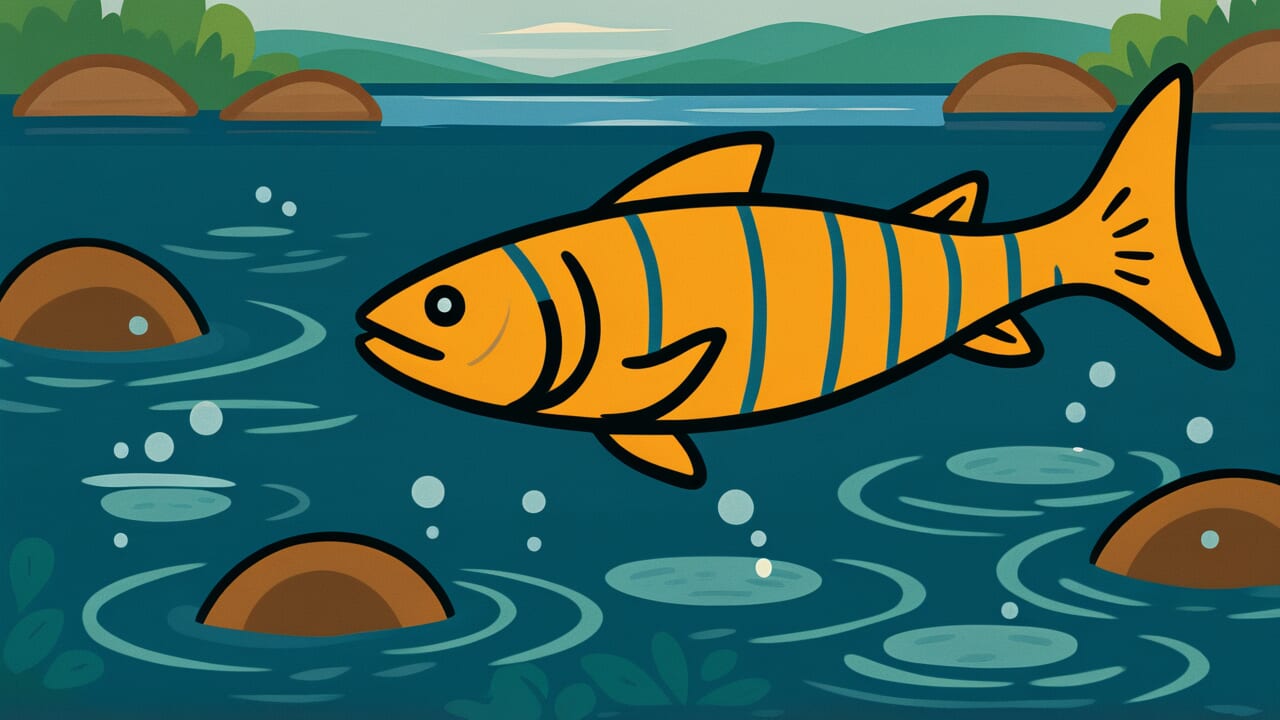How to Read “A big fish does not live in a small pond”
Taigyo wa shōchi ni sumazu
Meaning of “A big fish does not live in a small pond”
“A big fish does not live in a small pond” means that talented people do not stay in small organizations or limited environments.
Just as a large fish feels cramped in a narrow pond and cannot fully use its abilities, people with talent and skill will not be satisfied in small places where they cannot use their strengths.
They naturally seek bigger stages where they can thrive.
This proverb is used to explain situations where capable people leave organizations. It also describes the reality that excellent talent cannot be retained.
The saying affirms the naturalness of seeking an environment that matches one’s abilities.
Today, people use it to understand the psychology of those considering job changes or independence. It also explains why organizations lose excellent personnel.
Origin and Etymology
No clear written records explain the origin of this proverb. However, we can make interesting observations from how the words are structured.
The contrast between “big fish” and “small pond” forms the core of this saying.
Large fish swim through wide oceans and big rivers. They migrate in search of abundant food.
If confined to a small pond, the fish cannot grow properly or demonstrate its true abilities.
This natural principle became a metaphor expressing a truth about human society.
Chinese classical thought includes a similar expression: “A dragon does not play in shallow waters.”
The idea that superior beings seek appropriate places was widely shared across East Asia.
Japan was influenced by this philosophy. The theory suggests that Japanese people created their own unique expression using the more familiar words “fish” and “pond.”
During the Edo period, talent mobility became active in samurai and merchant circles.
Excellent people increasingly moved to places where they could demonstrate their abilities.
Against this social background, this proverb became established as an expression that resonated with people’s real experiences.
Usage Examples
- With his level of ability, “a big fish does not live in a small pond”—he will eventually move to a bigger stage
- Excellent employees keep quitting one after another. I suppose “a big fish does not live in a small pond”
Universal Wisdom
The proverb “A big fish does not live in a small pond” brilliantly captures the universal essence of human growth needs.
Why don’t talented people stay in small environments? It’s not simply ambition or greed.
It’s an impulse rooted in our instinct as living beings.
Just as fish seek the wide ocean, humans cannot help but search for places where they can maximize their potential.
This is a truth that transcends time and culture.
When talented people cannot be satisfied in cramped environments, it’s not selfishness. Rather, it’s evidence of healthy growth.
This proverb has been passed down through generations because it offers important insights to both leaders and workers.
From the organization’s perspective, it teaches that retaining excellent talent requires providing a “pond large enough” for them to swim in.
From the individual’s perspective, it suggests that when you feel your growth has stopped, it might be time to change your environment.
Humans are essentially beings who challenge their limits and pursue greater possibilities.
Our ancestors expressed this unchanging nature through the easy-to-understand metaphor of fish and ponds.
When AI Hears This
The reason large fish cannot survive in small ponds is hidden in the relationship between body size and required energy.
Ecology has a law called “metabolic scaling.” When an organism’s weight doubles, the required energy doesn’t double—it only increases by about 1.68 times (2 to the 0.75 power).
This means being larger is more efficient.
Looking at this from the reverse angle, a 1-kilogram fish needs 10 grams of food daily. But a 10-kilogram fish doesn’t need 100 grams—it needs about 56 grams.
The total amount of food a small pond’s ecosystem can produce is limited. Supporting just one large fish would deplete the pond’s entire resources.
Even more important is the concept of “minimum viable population.”
Any organism needs a minimum number of individuals to maintain genetic diversity. For large fish, this is usually over 50 individuals.
So big fish cannot live in small ponds not just because of one fish’s energy demands. There’s a double constraint: the species needs multiple individuals to survive, but small ecosystems cannot support them.
This applies to organizations and talent too.
The cost of maintaining one excellent person is high. Furthermore, letting them demonstrate their abilities requires peers of the same level.
Small organizations cannot support this physically or financially. It’s an ecological necessity.
Lessons for Today
This proverb teaches us two important things about living in the modern world.
First, about your own growth. If you feel cramped where you are now, it might be a sign of growth.
When your abilities exceed your environment, seeking new challenges is not betrayal. It’s a natural choice.
What matters is calmly determining whether you are truly a “big fish.” If you really are, have the courage to venture into the wide ocean.
Second, there’s a lesson for those who nurture people and lead organizations.
If you don’t want to lose excellent talent, you need to provide enough width and depth for them to swim.
This doesn’t necessarily mean making the organization bigger.
There are various ways to “expand the pond”: challenging work, growth opportunities, expanded discretion.
People can only demonstrate their true value in the right environment.
Constantly asking where your “wide ocean” is will be the key to a fulfilling life.



Comments